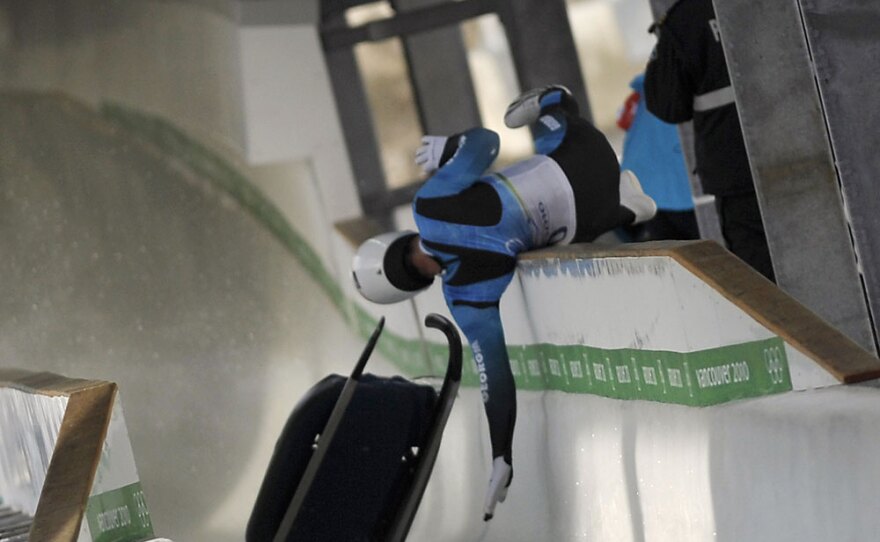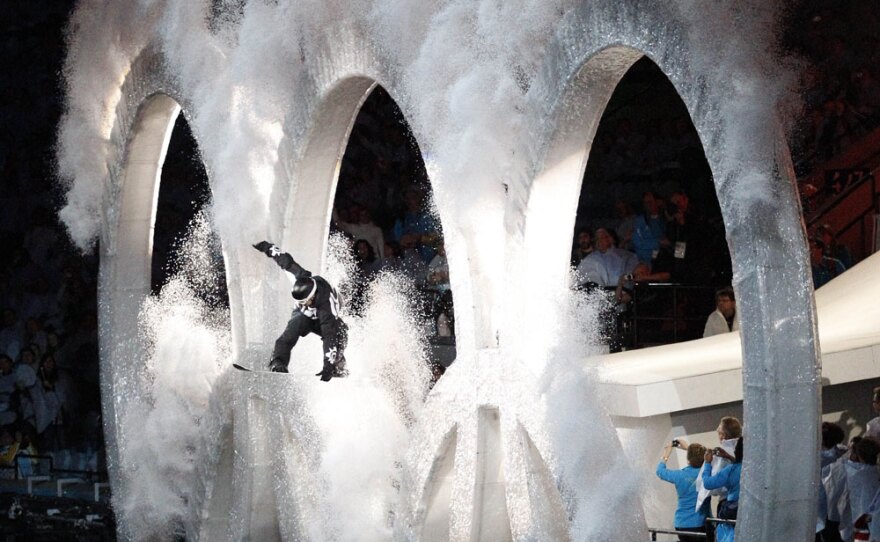In time-honored tradition, the show went on.
Despite the training-run death earlier in the day of a luger from the country of Georgia, the Olympics' opening ceremonies were launched Friday night with a jubilant countdown by the crowd filling BC Place Stadium.
The festive mood, and the opening rain of confetti, contrasted sharply with the grief that befell the games earlier in the day when luger Nodar Kumaritashvili of the republic of Georgia died in a horrific crash on the sliding track at Whistler.
"This is a very sad day," said a visibly shaken Jacques Rogge, president of the International Olympic Committee. "The IOC is in deep mourning."
While protesters and rain clouds gathered outside, more than 50,000 ticketholders packed into the stadium for the evening extravaganza, the first Olympic opening or closing ceremony ever held indoors. Rain was forecast through the weekend in the city, with high temperatures near 50 degrees, prompting some to dub these the Spring Olympics.
Kumaritashvili died during a training run Friday. Officials said he lost control of his sled, went over the track wall and appeared to hit a steel pole near the finish line.
The Georgian delegation decided to remain in the competition, wearing black stripes in their teammate's honor.
"We are heartbroken beyond words," said John Furlong, chief executive of the Vancouver organizing committee.
On the ski slopes, the wrong kind of precipitation prevailed. American Lindsey Vonn still could not test her painful and injured shin after training runs were again delayed by weather conditions.

The poor conditions postponed the women's super-combined Alpine race, which had been scheduled for Sunday. The course is soft, unsafe and foggy.
Similar conditions existed Thursday, when Italian skier Lucia Recchia said she "couldn't see from one gate to the other down here."
Heavy rain continued to bedevil the snowboarding and freestyle skiing courses at Cypress Mountain. Crews have trucked and flown in more than 300,000 cubic feet of snow, but continued warmth and rain have officials considering delays in competition.
"The weather hasn't been in our favor in the last several weeks, and as we move into the next few days it's not," said Cathy Priest Allinger, operations director for the games.
The Olympic flame reached the stadium after a 106-day torch relay across Canada, passing through more than 1,000 communities in every province and territory.
The relay was the occasional target for protesters, and Friday was no exception.
Activists espousing a variety of causes prompted the relay to change course twice as it passed near Vancouver's impoverished Downtown Eastside neighborhood.
Canadians expect to dominate the games, with home-country athletes sure to win the first Canadian gold medal on home turf.
No Canadian athletes stood at the top of the podium during the 1976 Summer Olympics in Montreal or the 1988 Winter Olympics in Calgary.
But home snow and ice advantage and a multimillion-dollar effort to produce medal-winning athletes have Canadian athletes ready to challenge the United States and Germany in the medal count.
In fact, the Canadian national anthem might play so often, this year's Olympics could be labeled the " 'O Canada' Games."
Furlong says the opening ceremony and the competition will "let Canada be seen on its own terms to the world, and have the world look at why Canada works."
There was nothing ambivalent about Nancy MacKenzie and her Canadian red cowboy hat, shirt, fleece jacket and gloves, all plastered with white maple leaves.
"We're excited about it being here," MacKenzie said. "Vancouver doesn't get that excited about things too often. I think it's a fantastic opportunity for us to get behind ourselves and our country, and support our athletes."
There are about 2,600 athletes from across the globe. The IOC announced Thursday that 30 athletes were told to stay home after testing positive for performance-enhancing drugs in pre-Olympic testing. Neither the athletes nor their home countries were named.
Most of the remaining athletes marched into BC Place Stadium on Friday night to celebrate 17 days of athletic effort, glory, disappointment and surprise. Given the record at past Olympics, their actions on and off the snow and ice are likely to produce a name for the games we can't begin to imagine now.
From NPR's Howard Berkes, NPR staff and wire services
Copyright 2022 NPR. To see more, visit https://www.npr.org. 9(MDAzMjM2NDYzMDEyMzc1Njk5NjAxNzY3OQ001))






